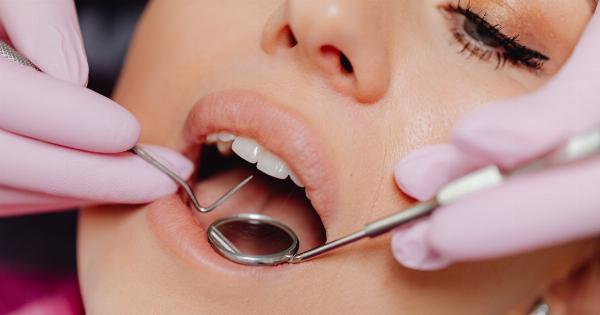The use of fluoride in oral care has been a topic of discussion and controversy for many years. While fluoride is widely acclaimed for its ability to prevent tooth decay, there are also concerns regarding its potential risks and side effects.
In this article, we will explore the risks and benefits of fluoride in oral care to help you make an informed decision about your oral health.
What is Fluoride?
Fluoride is a natural mineral that is found in soil, water, and various foods. It is known for its ability to strengthen tooth enamel and prevent tooth decay.
For this reason, fluoride has been added to many dental products, such as toothpaste, mouthwash, and even public water supplies in certain areas.
The Benefits of Fluoride
There are several benefits associated with the use of fluoride in oral care:.
1. Prevention of Tooth Decay
Fluoride helps prevent tooth decay by remineralizing weakened tooth enamel and reversing early stages of acid damage. It forms a protective barrier on the teeth, making them more resistant to acid attacks from bacteria and sugars in the mouth.
Regular use of fluoride can significantly reduce the risk of cavities and dental caries.
2. Strengthening Tooth Enamel
Fluoride promotes the growth of stronger tooth enamel, which is crucial for maintaining healthy teeth. Strong enamel helps prevent tooth sensitivity, enamel erosion, and tooth fractures.
3. Safe and Cost-Effective
Fluoride is a safe and cost-effective preventive measure against tooth decay. Compared to the cost of dental treatments for cavities and other oral health issues, using fluoride toothpaste or receiving fluoride treatments is relatively inexpensive.
The Risks of Fluoride
While fluoride offers significant benefits, it’s important to consider the potential risks associated with its use:.
1. Fluorosis
One of the main concerns related to fluoride is the risk of fluorosis, which is the cosmetic discoloration or mottling of tooth enamel. Fluorosis occurs when excessive fluoride is ingested during tooth development, typically in childhood.
The appearance of mild fluorosis is characterized by faint white lines or specks on the teeth. Severe fluorosis can result in brown stains and pitted enamel.
2. Allergic Reactions
Some individuals may be allergic or hypersensitive to fluoride. Allergic reactions can manifest as skin rashes, itching, and swelling. If you experience any adverse effects after using fluoride products, it’s essential to seek dental advice.
3. Overconsumption
Too much fluoride intake can result in an overdose, known as fluoride toxicity. Symptoms of fluoride toxicity include nausea, stomach pain, diarrhea, and muscle weakness.
However, it’s important to note that fluoride toxicity is rare and typically only occurs with accidental ingestion of large amounts of fluoride, such as swallowing a whole tube of toothpaste.
How to Safely Use Fluoride
To reap the benefits of fluoride while minimizing the risks, here are some guidelines for safe use:.
1. Follow Dental Recommendations
Consult with your dentist to determine the appropriate fluoride treatment for your specific oral health needs.
Your dentist will consider factors such as your age, dental history, and risk of tooth decay before recommending fluoride products or treatments.
2. Monitor Fluoride Intake
Be conscious of your overall fluoride intake from various sources, including toothpaste, mouthwash, drinking water, and diet.
This is especially important for young children who may be more prone to swallowing toothpaste or drinking fluoridated water excessively. Use age-appropriate fluoride toothpaste for children to avoid overexposure.
3. Spit, Don’t Rinse
After brushing your teeth with fluoride toothpaste, spit out the toothpaste rather than rinsing your mouth. This allows the residual fluoride to remain on your teeth for a longer period, enhancing its effectiveness.
4. Supervise Young Children
Supervise young children during brushing to ensure they use an appropriate amount of toothpaste and spit it out. This helps prevent accidental ingestion of excess fluoride.
The Bottom Line
Fluoride offers significant benefits in oral care, including cavity prevention and tooth enamel strengthening. Used appropriately, it is a safe and cost-effective way to maintain good oral health.
However, it’s crucial to be aware of the potential risks associated with fluoride, such as fluorosis and allergic reactions. By following dental recommendations, monitoring fluoride intake, and practicing good oral hygiene, you can enjoy the benefits of fluoride while minimizing the risks.

























